Key takeaways:
- Gender equality advocacy focuses on dismantling systemic barriers and amplifying marginalized voices, promoting awareness and empathy.
- Advocacy for survivors is vital for creating safe spaces, shifting societal narratives, and pushing for systemic changes in support systems.
- Challenges for survivors include fear of not being believed, emotional tolls from reliving trauma, and navigating fragmented support structures.
- Effective advocacy involves building relationships, educating the community, and utilizing social media to empower and connect survivors.
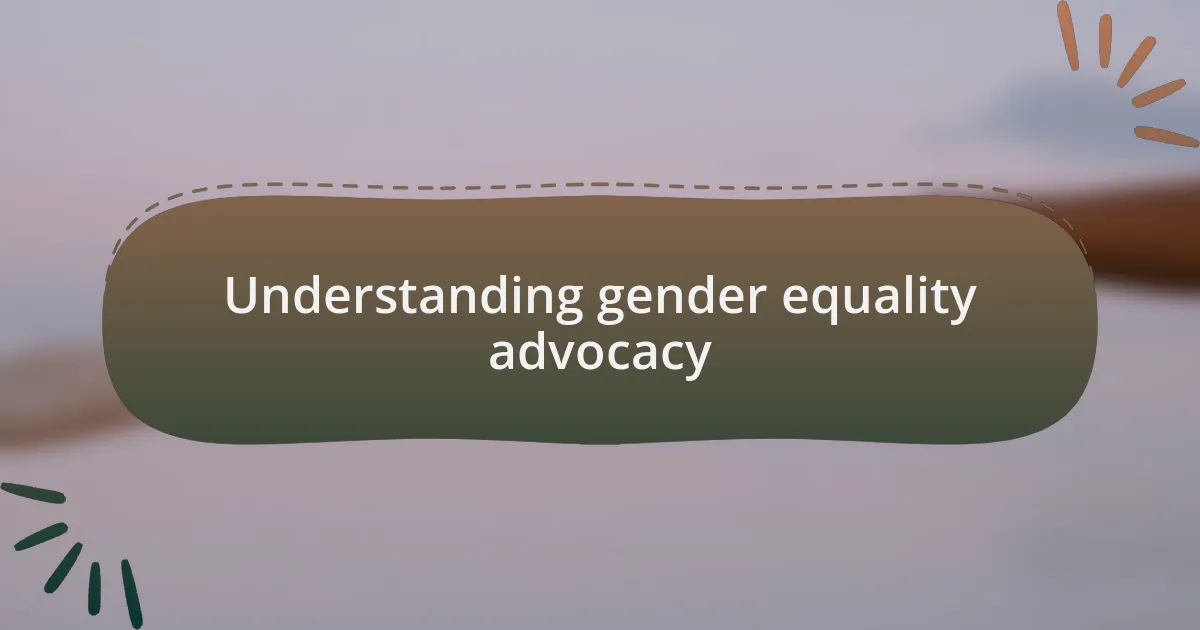
Understanding gender equality advocacy
Gender equality advocacy is about recognizing and dismantling the systemic barriers that prevent individuals from achieving equal rights and opportunities, regardless of their gender. I remember a workshop I attended where a survivor bravely shared her story; it hit me just how deeply these inequalities affect people’s lives. How can we stand by and allow these injustices to continue?
At its core, advocacy involves amplifying marginalized voices and ensuring their needs are met. I still recall my first experience speaking at a local event—it felt empowering to share insights on gender-based violence. When we empower survivors to tell their stories, we’re not just raising awareness; we’re helping to reshape the narrative around gender equality.
Furthermore, it’s crucial to understand that advocacy isn’t limited to protests and rallies. I often engage in conversations about gender equality in everyday settings, like my coffee shop or community gatherings. Isn’t it fascinating how small dialogues can lead to bigger shifts in understanding and attitudes? Engaging in discussions can catalyze change in ways we might not initially perceive.
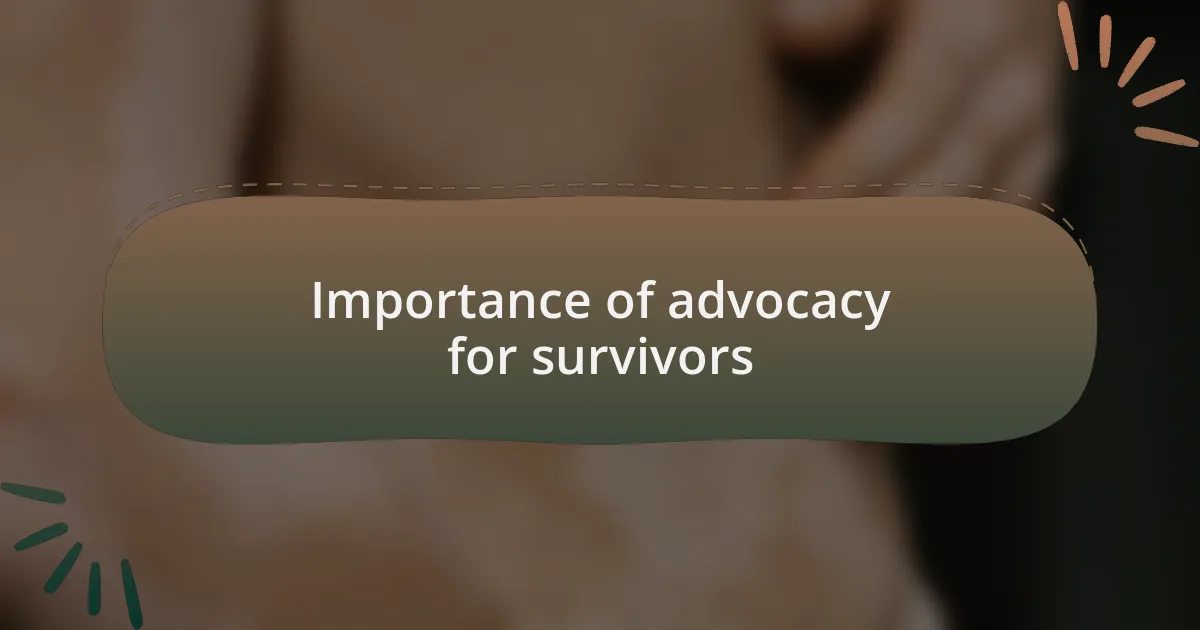
Importance of advocacy for survivors
Advocacy for survivors is essential because it creates safe spaces where their voices can be heard. I remember meeting a survivor who felt invisible for years until someone acknowledged her pain and encouraged her to speak out. That moment reinforced my belief that when we lift up their stories, we not only validate their experiences but also inspire others to come forward.
Moreover, advocating for survivors helps shift the societal narrative surrounding gender-based violence. I’ve witnessed firsthand how sharing survivor stories can alter public perception; there was a community event where individuals openly discussed their struggles, and the response was overwhelmingly supportive. How can we call ourselves allies if we don’t actively challenge the stigma surrounding these difficult conversations?
Lastly, effective advocacy pushes for systemic changes that enhance the support systems available to survivors. For example, in my advocacy work, I’ve engaged with local lawmakers to push for better resources in shelters and counseling services. Isn’t it powerful to think that our collective efforts can lead to concrete changes that better protect and support survivors? The ripple effect of advocacy can truly transform lives.
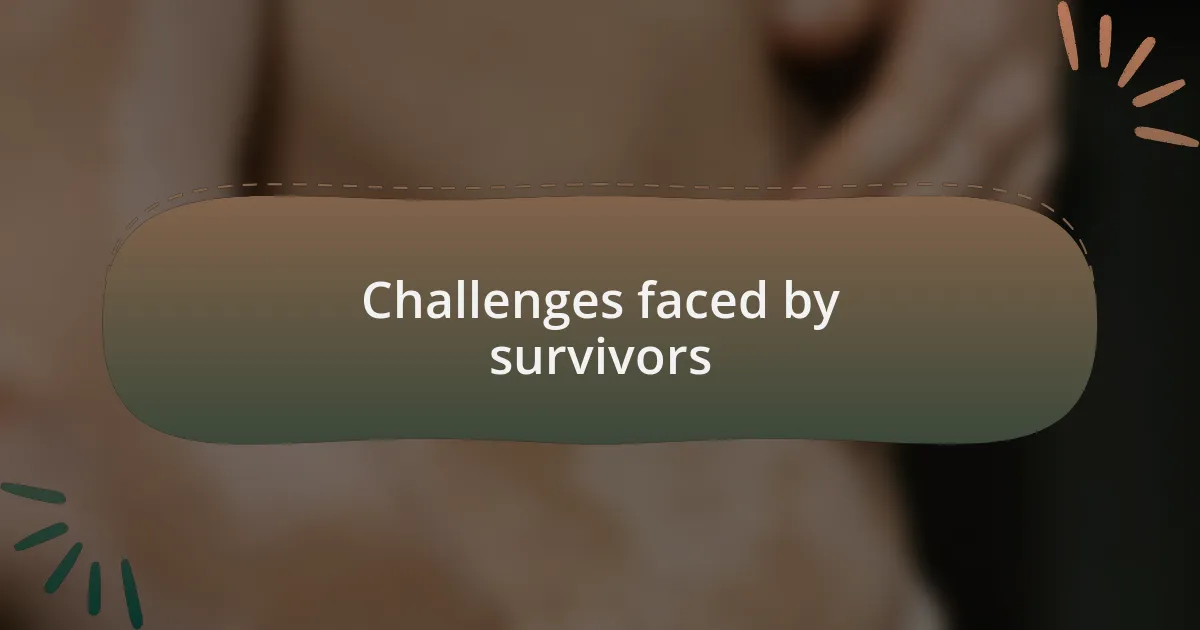
Challenges faced by survivors
Survivors often face immense barriers in seeking help, and one of the most significant is the fear of not being believed. I recall a conversation with a friend who hesitated to share her experience because she feared judgment. This realization hit hard for me; it made me understand just how deeply the lack of trust in a survivor’s story can hinder their journey to healing. How many potential voices are silenced by the thought that no one will believe them?
Another challenge is the emotional and psychological toll that comes with reliving trauma. During a workshop, I watched as participants opened up about their experiences, and it was evident how draining that process can be. I remember the tears welling up as one young woman spoke; her raw vulnerability revealed the heavy burden survivors carry. Why do we often underestimate the emotional labor required when discussing these painful memories?
Additionally, survivors frequently encounter systemic obstacles that complicate their healing, such as insufficient resources or support from institutions. I once spoke with a dedicated social worker who shared that many survivors she helped had to navigate a patchwork of services, often falling through the cracks. Doesn’t it make you wonder how we can demand change if the systems designed to help are fragmented and uncoordinated? These challenges underscore the urgent need for more comprehensive support structures in our advocacy efforts.
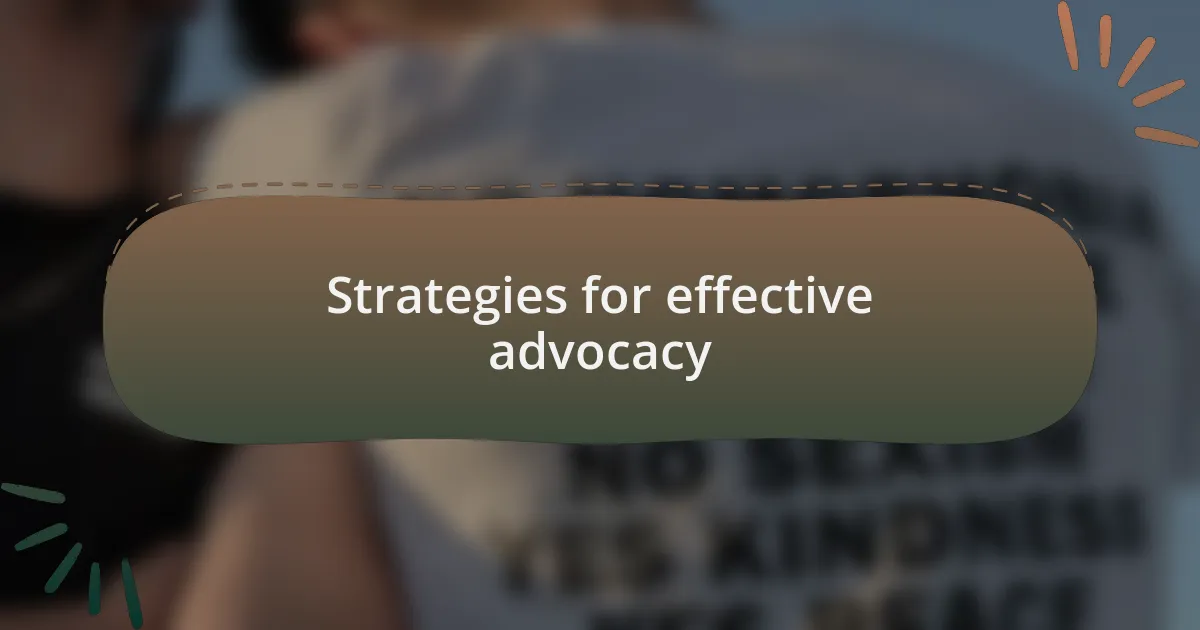
Strategies for effective advocacy
Advocating effectively for survivors requires a multifaceted approach, grounded in empathy and collaboration. I’ve learned that building genuine relationships with survivors can create a safer environment for them to share their stories. When I organized community outreach events, I noticed how meaningful it was to provide a platform where survivors could express their thoughts without fear of judgment. Doesn’t fostering trust like this empower them to reclaim their narratives?
Another key strategy is educating both advocates and the public about the issues survivors face. I remember hosting a workshop where we explored common misconceptions surrounding trauma. The conversations that emerged were eye-opening; participants revealed how misinformed perceptions often prevent proper support. Isn’t it essential to dispel these myths to build a more informed community that stands in solidarity with survivors?
Moreover, utilizing social media as a tool for advocacy has proven incredibly powerful. I once initiated an online campaign that highlighted survivor stories and resources, creating a digital space for connection and support. The outpouring of responses showed me how such platforms can amplify voices and facilitate dialogue. How can we harness technology to not just share information, but also foster resilience among survivors?
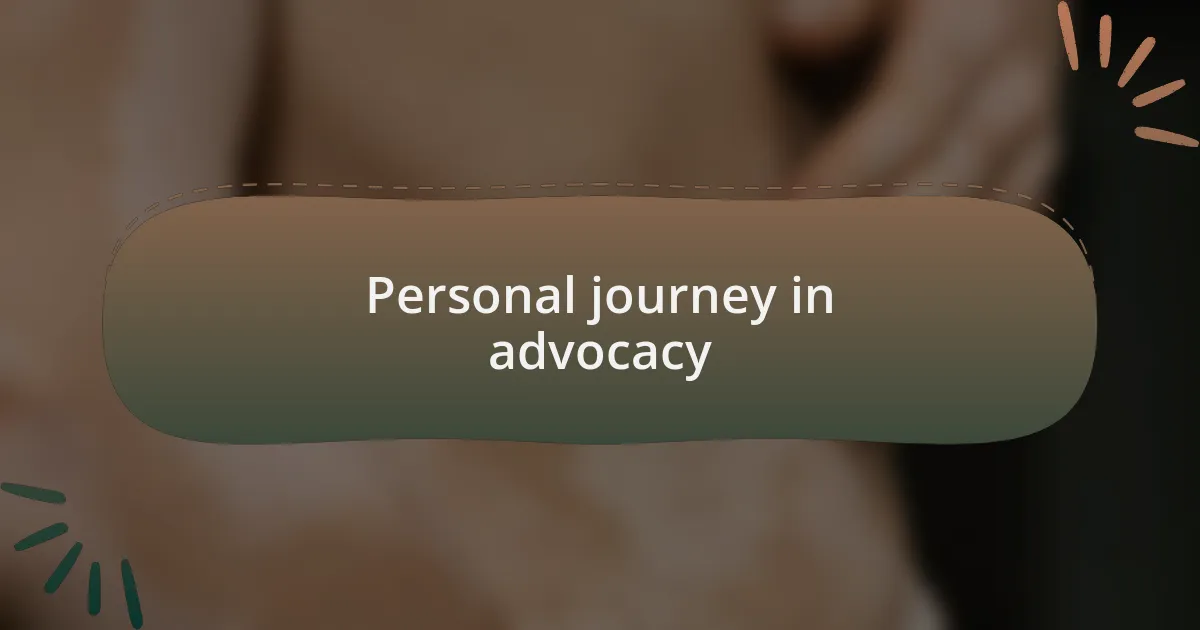
Personal journey in advocacy
My personal journey in advocacy really began when I received a poignant letter from a survivor. She described how years of silence had weighed on her, but finding our support group inspired her to speak up. Reading her words reminded me of the importance of creating safe spaces. How often do we underestimate the impact of simply listening and being present for someone in their time of need?
There was a moment at a local rally that deeply touched me—I met a young woman, visibly nervous, who shared her experience for the first time. I felt a wave of emotions; her courage was palpable, yet I could sense her fear. Afterward, she thanked me for encouraging her to take that step. It crystallized my belief: when advocates stand shoulder to shoulder with survivors, we can ignite change together.
Reflecting on my experiences, I realize that every conversation has shaped my perspective on advocacy. Each survivor’s story is a thread in a much larger tapestry of struggles and triumphs. Isn’t it fascinating how every interaction teaches us something new about compassion and resilience? I’m constantly reminded that advocacy is not just about speaking out; it’s about creating an ongoing dialogue that honors and uplifts every voice.
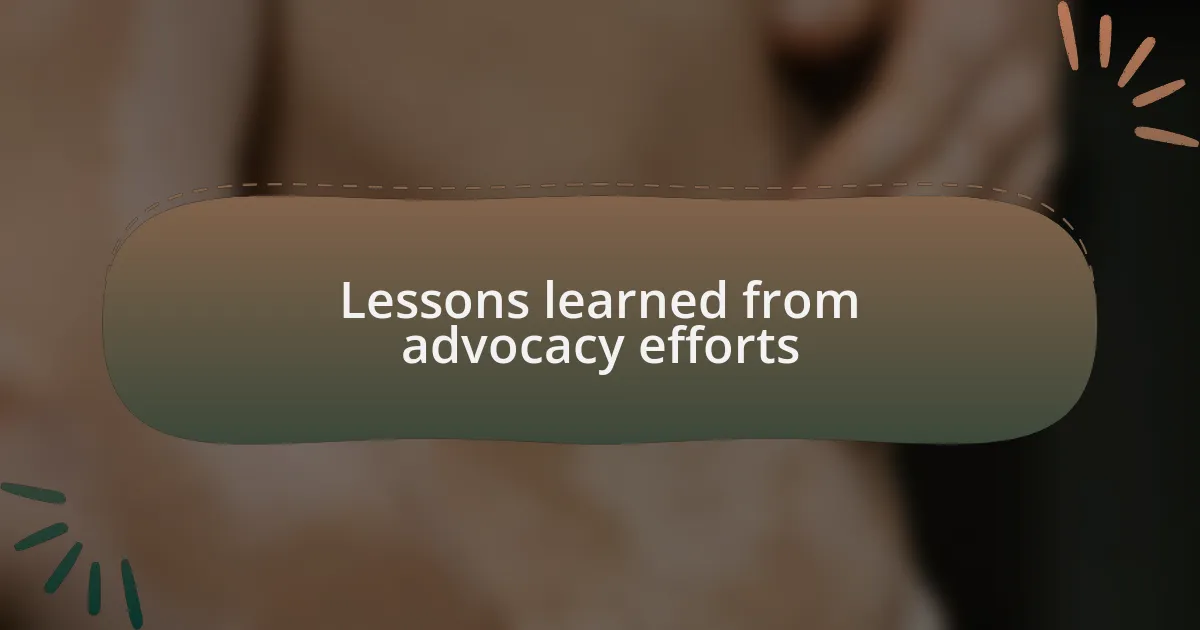
Lessons learned from advocacy efforts
When I first started advocating, I found that not every message was met with understanding. At one community event, I shared stories of survivors, only to be met with skepticism from some attendees. That moment taught me the importance of patience; advocacy isn’t just about making noise—it’s about fostering understanding. How do we help others see the importance of these stories? I learned that connecting on a human level is the key to breaking down barriers.
One powerful lesson was realizing the significance of allyship. During a workshop, I witnessed a fellow advocate amplify a survivor’s voice rather than overshadow it. It struck me that true advocacy often involves stepping back and letting others lead. This experience made me question my role as an advocate: Are we truly creating a platform for survivors, or are we unintentionally silencing them in our efforts to help? I understood that sometimes, the most impactful thing to do is to support from behind, allowing the person at the forefront to shine.
I also discovered that self-care is a vital component of advocacy. One late night, driven by passion and determination, I burned myself out trying to organize a support program. It was a wake-up call. I realized that if I don’t take care of my own well-being, I can’t effectively support others. How can we expect to advocate for survivors if we neglect our own mental health? Each lesson, each moment of reflection, reinforces the need for balance—advocacy is a marathon, not a sprint.
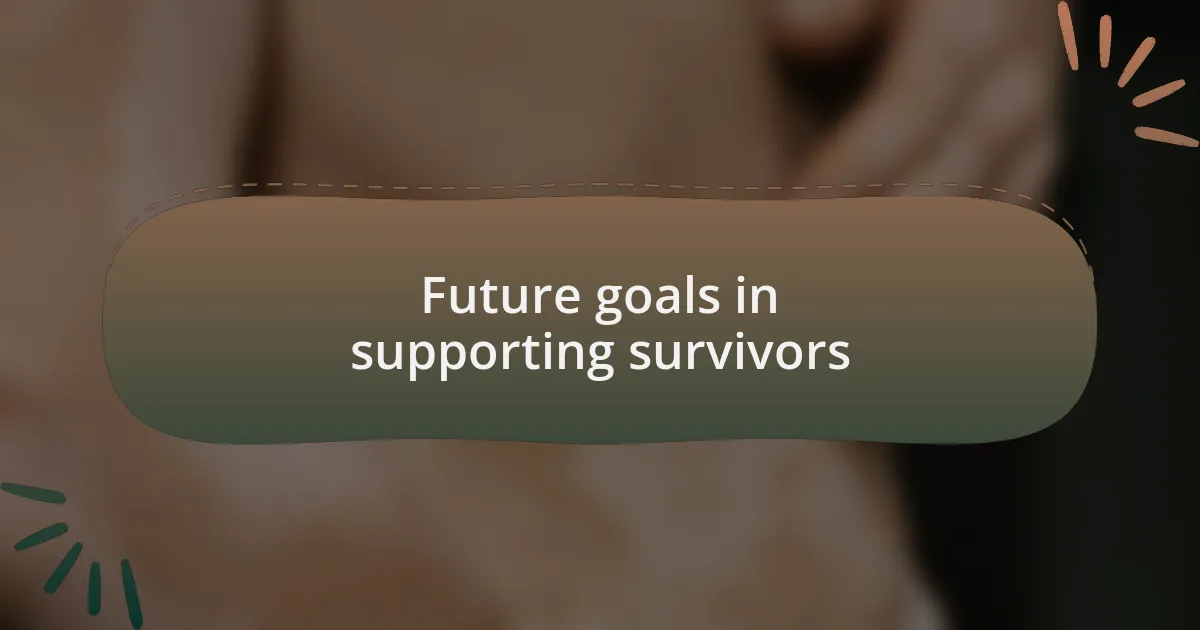
Future goals in supporting survivors
When I think about the future goals in supporting survivors, I envision creating a more robust network of resources tailored to their specific needs. I recall a time when a survivor reached out to me, feeling lost and unsure of where to find help. That experience made me realize how crucial it is to bridge gaps in available services. How can we ensure survivors know where to turn? By strengthening community partnerships and centralizing information, we can create a lifeline for those who need it most.
One goal that stands out to me is advocating for better policies that protect survivors. I remember attending a town hall meeting where we discussed the shortcomings of existing legislation. Hearing passionate testimonies from survivors illustrated the urgent need for change. How can we continue to lift their voices in these important conversations? By actively pushing for legislative reform and creating platforms where survivors can share their experiences, we can foster real, systemic change.
Additionally, I believe in the power of education as a tool for prevention and empowerment. I once led a workshop for young people on recognizing and responding to unhealthy relationships. The engagement in the room was palpable, and it underscored the importance of early education. How do we instill knowledge in future generations? By integrating survivor stories into educational curricula, we can cultivate empathy and understanding that lasts a lifetime, making a profound impact on future attitudes and behaviors.